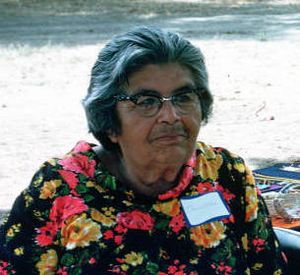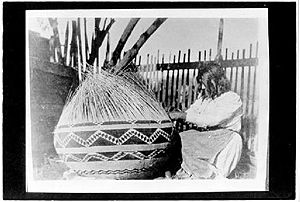Elsie Allen facts for kids
Quick facts for kids
Elsie Allen
|
|
|---|---|

Elsie Allen in 1975 in Covelo, California
|
|
| Born |
Elsie Comanche Allen
September 22, 1899 |
| Died | December 31, 1990 (aged 91) California
|
| Nationality | Pomo |
| Education | Self-taught |
| Known for | Basket weaving |
Elsie Comanche Allen (born September 22, 1899, died December 31, 1990) was a very important Pomo Native American artist. She was known for her amazing basket weaving skills. Elsie helped keep the traditional Pomo way of making baskets alive. She also taught others how to create these beautiful art pieces. She came from the Cloverdale Rancheria of Pomo Indians of California in Northern California.
Contents
Elsie's Early Life
Elsie Comanche Allen was born on September 22, 1899. Her birthplace was near Santa Rosa, California. Her parents, George and Annie Comanche, worked on farms. This was a common job for Pomo people back then. Elsie's father passed away when she was eight years old. Her mother then remarried and moved the family to Hopland.
Elsie's first language was Pomo. She only spoke Pomo until she was 13. Then she started learning English at a school in Covelo, California. She attended this school for less than a year. After that, she went to a day school where she felt more comfortable. Elsie became very good at speaking English during her teenage years.
She lived in several Pomo communities, including Cloverdale. Her grandmother raised her there. She also lived in Pinoleville Rancherias. When she was 18, Elsie lived briefly in San Francisco. She worked as a housekeeper and in a hospital. In San Francisco, she met her future husband, Arthur Allen. Elsie married Arthur Allen in 1919. He was part Pomo and part English. They had four children between 1920 and 1928. Their children were Genevieve, Leonard, Dorothy, and George.
Helping Her Community
Elsie Allen was not only a great basket weaver. She was also very active in her community. Even while working and raising her children, she helped many groups. She joined several Pomo and Hintil women's clubs. These groups worked to make life better for Pomo communities.
As a female leader in her community, Elsie worked hard. She promoted education and keeping their culture alive. She also fought for Native rights. Because of her efforts, her community saw her as a wise cultural expert. They even called her "Pomo Sage." She also received an honorary Doctor of Divinity degree.
Elsie worked to make sure Pomo students had money for school. She organized fundraisers and helped set up scholarships. These scholarships helped Pomo students get an education. Allen also helped with a case about businesses. These businesses would not let Pomo and white people sit together. She worked to make sure everyone was treated fairly.
Amazing Basket Weaving
The Pomo people traditionally lived near the Russian River in California. This area includes Sonoma, Mendocino, and Lake counties. This region has many plants perfect for basket weaving. These include willows and sedges.
Elsie came from a family of skilled basket weavers. Her mother, Annie Ramon Gomachu Burke (1876–1962), was a weaver. Her grandmother, Mary Arnold (1845–1925), was also a weaver. Both were from Cloverdale Rancheria. Elsie's mother, Annie, started the Pomo Indian Women's Club. This club helps promote the tribe's basketry. Annie also convinced Elsie to keep her baskets. Traditionally, baskets were burned or buried. But Annie wanted Elsie to save them for future basket makers.
Elsie learned to weave when she was a child. However, she could only weave full-time when she was 62. By then, all her children were grown. In the 1950s and 1960s, fewer Pomo people were interested in basketry. So, Elsie started teaching anyone who wanted to learn. This caused some discussion in her tribe. She taught at the Mendocino Art Center. She taught both Native and non-Native students. Her goal was to save the art of basket weaving. Later in her career, Elsie started using store-bought materials. She did this after having a special vision. One of her last students was her niece, Susan Billy.
Elsie's Legacy
Elsie Allen passed away on December 31, 1990. She was 91 years old.
Elsie Allen is known as one of the three best California basket weavers of her time. The other two were Mabel McKay and Laura Somersal. Elsie Allen is the main topic of several books. These include "Remember Your Relations: Elsie Allen Baskets, Family, And Friends" from 2005. Another book is "A promise kept: Basketry of the Pomo and the Elsie Allen basket collection" from 1996.
Elsie Allen High School in Santa Rosa, California, is named after her.
Published Work
- Allen, Elsie. Pomo Basketmaking: A Supreme Art for the Weaver. Red. ed. Happy Camp, California: Naturegraph Publishers, Inc. (1972).
See also


